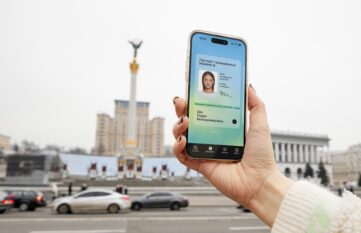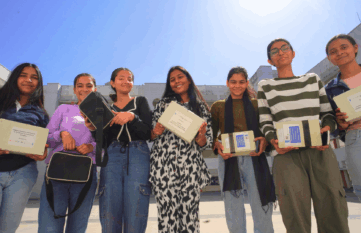The global community is working on regulations in digital spaces – as with the Global Digital Compact, which is to be adopted in 2024. What is to be made of it? Questions for Robert Opp from the United Nations Development Program (UNDP), Chief Digital Officer of over 20,000 employees in 170 countries.
Mr. Opp, why do we need a Global Digital Compact?
Robert Opp: We still live in a world where 2.6 billion people do not have access to the Internet. At the same time, emerging technologies are becoming more and more powerful. Hence, one of the basic questions that we have to ask ourselves as a global community is how are we going to put everybody on the same page when it comes to digital? How do we make sure that people are not being left behind? And in the context of the fast-paced technology development that we have, how do we make sure people and their rights and values and concerns are put at the center of technology? I think the Global Digital Compact is an excellent opportunity for the global community to come forward and put these issues at the forefront.
Which are the most pressing questions, that the Digital Global Compact should answer from your perspective?
How do we make sure that the Internet, which is the kind of global public good, does not become increasingly fragmented? How do we make sure that people and their rights to privacy are put at the center in the deployment of technology? And how can we make sure that the Universal Declaration of Human Rights is translated online? Whether it’s the freedom of association or just basic protection against harassment and abuse, we need to make sure that online environments basically have the same safeguards and parameters put around them that we make sure are done in the physical worlds. And while I think most are clear on that principle, the practice needs to be worked out.
If you can allow me a last point, there’s also the question that is becoming increasingly present in the public’s mind around how are we going to govern, for example, the emergence of very powerful artificial intelligence technologies.
And why do states and civil societies and companies have a unifying interest in this?
It affects everybody. It is not an understatement to say that we are at a critical point in the history of humanity where some of these issues have to be addressed. Whether you’re a business or a civil society member or a government or an international organization like us, I think it’s in everybody’s interest that we raise some of these issues globally and take one key direction as humanity on how we’re going to address them. From a human development perspective, how will we ensure that people have better access to education, better access to jobs and job skilling in the new economy? All countries need to ask: How do we prepare ourselves for the future?
But why should by example an international business say: I am going to be part of this, I support this! Would it not rather think: Why should I support this? It can only hinder me to earn money.
What I hear out of contacts within Big Tech companies is that they actually are looking for the ‘rules of the game’. You can make a case that Big Tech could in some ways make short term profits off of having a lack of regulation. But many of these companies would rather know where they stand and how this is going to evolve. Having some kind of global guidance is important for their planning. At the same time, I also increasingly see a great willingness among tech companies and among all companies to put concerns about people and about environment first and say that a people-centred and sustainable approach has to be part of our considerations within their business model.
How would you describe the current situation then? Are we still in a thicket of different, sometimes contradictory or lacking regulations?
Our challenge is that technology is emerging faster and becoming more powerful at a pace that is faster than most of our government legislative institutions can actually keep up with. This has been a problem for a while. I think it’s getting more acute and people are feeling it. It’s very difficult for any government around the world to figure out how to appropriately regulate and govern these new technologies. For the partner countries that we work with that, many of whom are the least developed countries, they have very little capacity to steer at all. I wouldn’t say that we live in a thicket, but the world of technology in particular is becoming more and more complex. We need to look at ways that we as an international community can start shaping common directions and then starting to help countries to get support for the governance and regulation of technology and make sure it works for people.
Our challenge is that technology is emerging faster and becoming more powerful at a pace that is faster than most of our government legislative institutions can actually keep up with.
Robert Opp, CDO, UNDP
The Global Digital Compact has now passed the informal, multi-stakeholder consultation phase. What is your impression – which are the most burning issues?
I have not attended all of the multi-stakeholder consultations, but what I would say is that the issues that we’ve been talking about here, the digital divide, how human rights are going to be translated online, the governance of AI for the future that puts people at the center, etc: These have all been issues that are frequently raised during the consultations. Many of the issues fundamental to the future of humanity are right at the center of these discussions. I think, we can already see the digital divide widening. Everyone realizes that connecting the 2.6 billion people that are not connected is really an important thing to do and make sure that they have a reliable and safe connections.
Hence, you see a common understanding that could reach a sound resolution?
It’s a little early to say that on every issue. There are differences among countries on how they view this. That’s just part and parcel of the international governmental system. I think we will see those differences come out as the negotiations go forward. I can’t comment on whether they’re going to be successful in all of the issue areas or not but I am hopeful there will be good progress.
And what role has Europe played so far, and Germany?
EU and Germany provide interesting models of other countries on potential models for the governance of digitalization that tries to put people and their rights at the center. The European Union’s GDPR legislation is an early example of how people’s privacy has been placed at the center and now there’s the Digital Markets Act and the Digital Services Act that have been discussed as well.
Maybe it’s easier for European countries to have high demands for security of data or privacy, because the most affected players and businesses are not based in Europe?
It’s true that the largest tech companies are based in the US and China, but there’s plenty of tech ecosystem in European Union as well. And so I think it’s as important there as anywhere.
Apropos Big Tech: What possibilities does the international community have, if data and with that significant influence is held by just a few companies and countries?
This is really one of the biggest questions that face us right now. These very powerful technologies like generative AI are concentrated in only a few hands at the moment. Global technology platforms may not be as relevant for solving local problems. One of the ways that we might adjust the balance here is to strengthen local digital ecosystems. So to make sure that people can develop new business models and use global technology and other tools to innovate locally. Another way is to promote the use of digital public goods. Digital public goods are basically open-sourced, freely available technology platforms that can be used to build very powerful business models.
Most importantly, we need to make sure that people at large are digitally literate, we need programmers and tech developers. Then we need to make sure that governments have the people and the capacity to create frameworks for this. As UNDP are quite concerned with in terms of making sure that countries, even those that are the poorest in the world, the least developed countries, are able to take advantage of some of these technologies.
When we have a compact, that would be just a lot of words at first. How can we leave theory behind and reach practice?
There will be a need for international organizations, tech companies, for existing international forums to come together and identify the concrete steps for implementation. For example, some of the conclusions around human rights online that may come out of the Global Digital Compact, they maybe need to be picked up by the Human Rights Council or the Office of High Commissioner for Human Rights. And other pieces of it around the digital divide need to be picked up by International Telecommunications Union (ITU) and other agencies and discussed at World Summit on the Information Society and the Internet Governance Forum. The Global Digital Compacts will be an important chance for the international community to review where we are and set necessary new direction on how we use technology, and the existing institutions become the platforms work working out and managing how these directions become practice.
When we speak about implementation: Do you think everything should be done voluntarily or should there be also kind of pressure?
The answer to that question will really differ from topic to topic. What’s important is that things like human rights should not be optional. These are principles already concluded by the UN. But there may be other issues there that are put forward more as voluntary spaces that countries can choose. The important thing for us is that people’s concerns being inclusive to make sure no one is left behind and making sure that their rights are put first.

© GIZ
Robert Opp is currently the Chief Digital Officer of UNDP. He leads the agency’s digital transformation, an organization-wide effort, to harness the power of new technology to improve the lives of those furthest behind. Prior to this role, Robert served as Director of the Innovation and Change Management Division within the United Nations World Food Programme (WFP).
Latest Update from the Global Digital Compact
The Global Digital Compact (GDC) is on its way. A thesis paper published in September 2023 defined the work tasks of the envisaged agreement: ‘While the GDC should not duplicate existing forums and processes’, write the co-facilitators Rwanda and Sweden, ‘there is an expressed need to identify and address gaps to make the UN system and international cooperation more efficient and coordinated in responding to new and emerging challenges posed by rapid technological developments.
The GDC is the result of an initiative by UN Secretary-General António Guterres. In the first half of this year, deep dives and consultations around the world took place, involving governments and non-governmental groups. They took a close look at topics such as digital inclusion, privacy, security and AI. The submissions have now been incorporated into the thesis paper that will be negotiated at a UN ministerial conference in New York in fall of 2023. The GDC is then to be adopted at the United Nations Summit of the Future in September 2024. The end result will not be a binding international treaty. But the GDC should make all governments more accountable for implementing the UN’s 2030 Sustainable Development Goals, which were adopted in 2015, in the digital sector as well.



